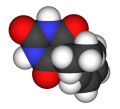Wikisage, the free encyclopedia of the second generation, is digital heritage
Phenobarbitone: Difference between revisions
Jump to navigation
Jump to search
No edit summary |
No edit summary |
||
| Line 1: | Line 1: | ||
or phenobarbital is a WHO recommended AED | or phenobarbital is a WHO recommended AED | ||
<gallery>File: Phenobarbital3d updated.png</gallery> | <gallery>File: Phenobarbital3d updated.png</gallery> | ||
phenobarbital induces enzymes of the cytochrome P450 system; like phenytoin, carbamazepine, and [[primidone]].<ref>http://www.jfmpc.com/text.asp?2016/5/2/248/192338 Arora E, Singh H, Gupta YK. Impact of antiepileptic drugs on bone health: Need for monitoring, treatment, and prevention strategies. J Family Med Prim Care | phenobarbital induces enzymes of the cytochrome P450 system; like phenytoin, carbamazepine, and [[primidone]].<ref>[http://www.jfmpc.com/text.asp?2016/5/2/248/192338 Arora E, Singh H, Gupta YK. Impact of antiepileptic drugs on bone health: Need for monitoring, treatment, and prevention strategies. J Family Med Prim Care (serial online) 2016 (cited 2016 Nov 28);5:248-53.]</ref> | ||
==Osteomalacia== | ==Osteomalacia== | ||
Revision as of 18:14, 1 December 2016
or phenobarbital is a WHO recommended AED
phenobarbital induces enzymes of the cytochrome P450 system; like phenytoin, carbamazepine, and primidone.[1]
Osteomalacia
The Impact of Anti-Epileptic Drugs on Growth and Bone Metabolism
antiepileptic drug-induced bone loss in young male patients who have seizures
Status epilepticus
Treatment of Established Status Epilepticus
Post encephalitic epilepsy
Effect of Antiepileptic Drugs for Acute and Chronic Seizures in Children with Encephalitis
- Lin K-L, Lin J-J, Hsia S-H, Chou M-L, Hung P-C, Wang H-S, et al. (2015) Effect of Antiepileptic Drugs for Acute and Chronic Seizures in Children with Encephalitis. PLoS ONE 10(10): e0139974. doi:10.1371/journal.pone.0139974
